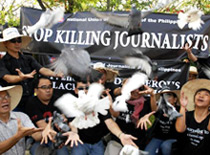Roundtable on impunity of crimes against journalists took place in Philippines
25-09-2009 (San Juan)

Filipino journalists are campaigning for
an end to the murders.
© AFP
Experts in law, human rights, history, political science, psychology, anthropology and communication joined media representatives in a roundtable discussion on the culture of impunity of crimes committed against journalists, on 15 September 2009 in San Juan, Philippines.
According to Florangel Rosario Braid, Chair of the Communication Committee of the Philippine National Commission for UNESCO, the discussion aimed to examine the problem of impunity of crimes committed against Filipino journalists, from a multidisciplinary perspective, with inputs from experts in social sciences. Through an analysis of the causes of impunity and of case examples, a policy framework and an action plan will be recommended to address the continued killing of journalists.
The Director-General of UNESCO, Koichiro Matsuura, already sounded an alarm for the increasing deaths of Filipino journalists, “who have been made to pay an intolerably heavy price to exercise the basic human right of freedom of expression”. He has called on the Philippine authorities to “spare no effort in bringing to justice the culprits of these crimes which undermine the rights and freedoms of all the citizens of the Philippines”.
The Center for Media Freedom and Responsibility reports that 134 Filipino journalists were killed from 1986 until August 2009. 80 of these murders were work-related. Since the beginning of 2009, six journalists have already been killed.
At the roundtable discussion, funded by UNESCO’s Office in Jakarta, and organized by the Asian Institute of Journalism and Communication (AIJC) and the Philippine National Commission for UNESCO, the participants decided to undertake a research that would examine culture, history, child rearing, education, media and economics of the Filipino society. They also recommended that the content and context of reports on the killings be analysed, and the families of victims, as well as the perpetrators of crimes, be heard and considered in the study.
The participants of the roundtable, together with other experts, will form an e-group to finalise the research framework and to share papers and case studies.
AIJC President, Ramon Tuazon, facilitated the roundtable discussion. Other participants represented the Centre for Media Freedom and Responsibility, the Centre for Community Journalism and Development, Kapisanan ng mga Brodkaster ng Pilipinas (National Association of Philippine Broadcasters), the Philippine Press Institute, the Freedom Fund for Filipino Journalists, the Philippines Communication Society and the Philippine Association of Communication Educators.
The Director-General of UNESCO, Koichiro Matsuura, already sounded an alarm for the increasing deaths of Filipino journalists, “who have been made to pay an intolerably heavy price to exercise the basic human right of freedom of expression”. He has called on the Philippine authorities to “spare no effort in bringing to justice the culprits of these crimes which undermine the rights and freedoms of all the citizens of the Philippines”.
The Center for Media Freedom and Responsibility reports that 134 Filipino journalists were killed from 1986 until August 2009. 80 of these murders were work-related. Since the beginning of 2009, six journalists have already been killed.
At the roundtable discussion, funded by UNESCO’s Office in Jakarta, and organized by the Asian Institute of Journalism and Communication (AIJC) and the Philippine National Commission for UNESCO, the participants decided to undertake a research that would examine culture, history, child rearing, education, media and economics of the Filipino society. They also recommended that the content and context of reports on the killings be analysed, and the families of victims, as well as the perpetrators of crimes, be heard and considered in the study.
The participants of the roundtable, together with other experts, will form an e-group to finalise the research framework and to share papers and case studies.
AIJC President, Ramon Tuazon, facilitated the roundtable discussion. Other participants represented the Centre for Media Freedom and Responsibility, the Centre for Community Journalism and Development, Kapisanan ng mga Brodkaster ng Pilipinas (National Association of Philippine Broadcasters), the Philippine Press Institute, the Freedom Fund for Filipino Journalists, the Philippines Communication Society and the Philippine Association of Communication Educators.
Related themes/countries
· Philippines
· Press Freedom
· UNESCO Remembers Assassinated Journalists
Share this story:














